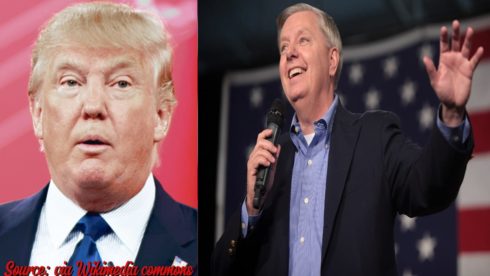South Carolina Senator Lindsey Graham revealed that former President Donald Trump played a pivotal role in derailing a bipartisan border security bill. This disclosure has reignited debates about the Republican Party’s commitment to solving the immigration crisis, as many have accused GOP leaders of prioritizing political gamesmanship over actual solutions.
“Everybody who comes on this floor and says that our border is broken, we should do something about it, you’re absolutely right,” Lindsey Graham stated. He went on to express frustration with the legislative stalemate, pointing out that Trump’s opposition to the Senate’s efforts had ultimately killed the bipartisan proposal.
Republicans’ Border Rhetoric vs. Legislative Inaction
For years, Republicans have sounded the alarm about the crisis at the U.S.-Mexico border, positioning themselves as champions of border security. However, Lindsey Graham’s remarks highlight a stark contradiction: despite their fiery rhetoric, Republican leaders, including Trump, have consistently obstructed efforts to address the issue through compromise.
Lindsey Graham acknowledged that while many in his party publicly decry the “broken border,” real legislative progress remains elusive. “Unfortunately, we didn’t get there,” Lindsey Graham lamented, referring to the bill’s demise. This failure calls into question the party’s sincerity when it comes to prioritizing solutions over political grandstanding.
Trump’s Opposition to Bipartisan Solutions Exposed
The failed bipartisan border bill would have required support from both Republicans and Democrats to secure the necessary 60 votes in the Senate. However, Lindsey Graham revealed that Trump’s opposition was a key factor in its downfall. The former president’s decision to “torpedo” the bill showcases a pattern of obstructionism, where political strategy seems to take precedence over governance.
Critics argue that Trump’s refusal to support a compromise solution demonstrates his lack of interest in actually addressing the border crisis. Instead, Trump appears focused on maintaining his political base by framing the issue as a campaign talking point rather than a serious policy challenge.
Lindsey Graham’s Frustration Signals a Growing Divide
Lindsey Graham’s comments also shed light on growing tensions within the Republican Party over how to address immigration and border security. Once a staunch Trump ally, Lindsey Graham’s willingness to publicly criticize the former president signals a possible shift in his stance. His frustration was palpable as he admitted, “President Trump opposed a Senate bill, we couldn’t find a better way forward that would get sixty votes.”
This division between Republican lawmakers who want practical solutions and those focused solely on political messaging underscores the difficulties facing the party as it navigates internal conflicts ahead of future elections.
Trump’s Border Hypocrisy: Election Strategy or Genuine Concern?
Trump has made border security a central theme of his political platform, frequently invoking the issue in his rallies. However, his actions, as revealed by Lindsey Graham, paint a different picture. By actively working against a bipartisan border solution, Trump’s motives appear to be more about winning elections than solving the crisis.
Critics of the former president argue that his opposition to meaningful reforms reflects his larger political strategy: using fear-mongering around immigration to energize his base while avoiding actual governance. Lindsey Graham’s admission adds fuel to the argument that Trump is more concerned with retaining power to evade legal consequences rather than improving the nation.
What Lies Ahead for Border Security Reform?
With Trump’s obstruction now out in the open, the future of any bipartisan effort to address the immigration crisis looks uncertain. While some Republicans may still push for comprehensive reform, Lindsey Graham’s admission suggests that Trump’s influence continues to loom large over the party, complicating any potential legislative path forward.
As Lindsey Graham concluded, “Now we have to deal with what’s left for us to take care of in the world.” This sentiment hints at a sense of resignation, as the broader immigration issue becomes another casualty of political infighting and personal ambitions. Only time will tell whether lawmakers can overcome these challenges and work toward meaningful reform.














